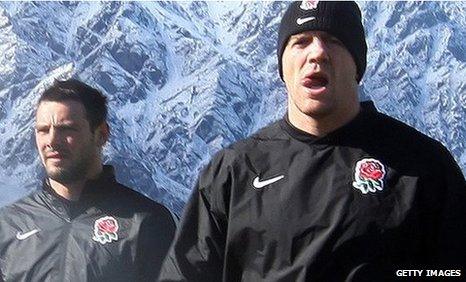Coping with the pressures of a World Cup
- Published

Captain Tindall (right) was pictured on a drunken night out with team-mates
The perfect remedy to an indifferent opening World Cup performance, it seems, is to have a few beers, relax, bond, and perhaps soothe frayed nerves after a narrow victory.
But as with many an evening involving liquor, there are inevitably morning-after regrets.
For some, it is because of evenings like these that friendship requests from the boss on Facebook are subtly ignored.
But as England's players have found out, when you are a professional rugby player representing your country at the sport's showpiece event, hiding evidence of high jinks and tomfoolery is about as easy as tackling former All Black giant Jonah Lomu in his prime.
Pictures of inebriated England players wrestling on a night out, during what was described as a "dwarf-throwing contest" at a nightclub called Altitude have predictably made headlines, even though manager Martin Johnson insists his men should be allowed to "relieve the pressure and let off steam".
And so comes the age-old problem, or a World Cup conundrum, of how to keep a group of young men, in a land far away from loved ones, content when the expectation of a nation is heaped on their, admittedly, broad shoulders.
Despite the brouhaha, Johnson has described, in public at least, his players' proposal to head out in search of the neon lights of Queenstown as a "great idea" and many agree that grown men should be trusted to act, and drink, responsibly.
Former England winger Josh Lewsey, a World-Cup winning team-mate of Johnson's in Australia eight years ago, told BBC Radio 5 live: "I can put my mortgage on the fact the guys wouldn't be out drinking the night before a game.
"That said every now and again it's good to get out after a game and bond and enjoy yourself. You talk about the physical preparation, but as much as anything else in these big tournaments it's about dealing with pressure and everyone has their own way of dealing with that.
"You've got to back people to do that and as long as that doesn't become detrimental to the team or offend anyone in the public, ultimately it's about making sure the guys are mature in terms of their decisions."
Murmurs of discontent emerged from the football World Cup in South Africa last year because of England manager Fabio Capello's regimented approach to the tournament.
England's performances were far from inspiring, so the theory goes, because the players were cooped in sleepy Rustenburg, idly listening to the ticking of clocks.
Players don't need babysitting - Lewsey
"You stay in a hotel all day but you are at a World Cup for a long time and should be able to experience different things," said Liverpool defender Jamie Carragher when he returned home following England's humiliating 4-1 defeat by Germany in the last 16, while Tottenham manager Harry Redknapp remembered hearing of players being "bored out of their brains".
Johnson, England's World Cup-winning captain from 2003, has been keen to learn from the mistakes of his footballing counterparts and, in keeping with rugby tradition, wants his players to embrace their new environment and socialise with each other and their adopted community.
"We know, when you've got a rugby team, part of it is the bonding off the field," said Johnson, who has also had to defend the decision to allow his players to complete the 134-metre Nevis bungee-jump during their day off.
"They worked really, really hard last week and produced a tough win under a lot of pressure. I don't want to have to lock people away and not let them go out."
Johnson defends players drinking
Lomu, a member of a New Zealand team billed as favourites at the 1995 World Cup before they fell as the final hurdle against South Africa, stressed that mental preparation is as important as being in physically tip-top condition.
"The World Cup is a different kettle of fish, you are living in each other's pockets," said the indomitable former winger.
"Six weeks is a long time to keep the mind fresh. You won't be able to get any fitter or stronger in that period, you can only maintain fitness.
"But you want to keep fit mentally and I think it is all going to come down to that, keeping your mental focus, being able to switch on and switch off. I think that is the key component of winning the World Cup."
If a happy team off the pitch is a happy team on it then, judging by the beaming smiles on the faces of the England players during their south island night out, the rugby on display from the men in white over the coming few weeks should be as free-flowing as the beer was on Sunday.
Rarely does rugby follow maxims, however, and only time will tell whether that night out in Queenstown will help or hinder England's World Cup campaign.